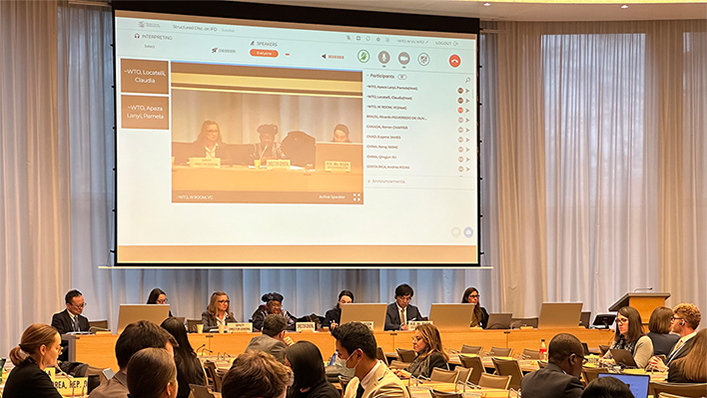
“This high-level stocktaking marks an important milestone in your negotiations towards a WTO Agreement on Investment Facilitation for Development. I understand you are working towards a text that is ‘as clean as possible’ by the end of this year, as a stepping stone to a meaningful and effective Agreement,” DG Okonjo-Iweala said.
“Attracting more sustainable foreign direct investment (FDI) flows is particularly important given the need to increase investment to drive growth, create jobs, enhance living standards, and reduce poverty. The current interconnected global crises of food, energy and debt distress, and lack of fiscal space make facilitating investment even more pressing. After falling for decades, extreme poverty levels are rising again, putting the Sustainable Development Goals further out of reach,” she added.
DG Okonjo-Iweala encouraged delegations to keep moving forward, particularly on a strong pro-development implementing mechanism in the form of an IFD needs assessment that will signal what the future Agreement has to offer developing and least-developed countries (LDC) in terms of technical assistance and capacity building support to help them attract more sustainable investment.
“Your efforts demonstrate that when members work together constructively and pragmatically, they can respond to economic shifts and better serve their own evolving needs,” she declared.
Her full remarks are available here.
Ambassador Chenggang Li of China said that promoting transparent, predictable and efficient investment environments is important for developing countries to attract FDI and expressed hope that a final Agreement will be one of the outcomes of the 13th WTO Ministerial Conference. He noted that developing members have contributed over 70 per cent of the text proposals in the negotiation, which demonstrates that attracting FDI is a key priority and shared interest of WTO members.
Ambassador José Valencia of Ecuador underlined that participating members have achieved a balanced draft with a high degree of convergence, which reflects the advanced state of the negotiations. “There are still some pending issues but the challenges that persist can be overcome. This will depend on the goodwill and flexibility of participants,” he said.
Ambassador João Aguiar Machado of the European Union welcomed progress made in recent months and encouraged participants to seize the momentum to finalize the text. “We are getting near,” noted the European Ambassador, thanking the flexibility shown by delegations by removing text proposals and submitting streamlined proposals to find landing zones on a range of key issues.
The latest negotiating text, that participating members agree to refer to as the “Draft IFD Agreement”, consolidates the ten successive updates made to the “Easter text” — the document used as the basis for the negotiations — since the first version was circulated to all members in April 2021.
In the statement presented to participating delegations, the co-coordinators of the negotiations, Ambassador Sofía Boza of Chile and Ambassador Jung Sung Park of the Republic of Korea, noted that the draft Agreement has been possible thanks to the collective efforts of participants and follows the principle that “nothing is agreed until everything is agreed”.
This text is the result of discussions held by more than 110 WTO members since the negotiations were formally launched in September 2020. It builds on around 60 text proposals submitted by participating members, out of which 43 are from developing and least-developed country (LDC) members, as well as text contributions from open-ended discussion groups.
The draft IFD Agreement includes convergence text for seven sections of the future Agreement: Section I on “Scope and general principles”; Section II on “Transparency of investment measures”; Section III on “Streamlining and speeding up administrative procedures”; Section IV on “Focal points, domestic regulatory coherence and cross-border cooperation”; Section V on “Special and differential treatment for Developing and Least-Developed Members”; Section VI on “Sustainable investment”; and Section VII on “Institutional arrangements and final provisions”.
The Agreement explicitly excludes market access, investment protection and investor-State dispute settlement, and contains a multi-pronged “firewall provision” to insulate the future Agreement from members’ existing and future international investment agreements. The text also builds on existing WTO agreements.
Participants plan to use the draft IFD Agreement as the basis for the next stage of the negotiations to facilitate outreach efforts, especially towards developing and LDC members.
In their statement, which takes stock of the discussions and negotiating outcomes in 2022 and looks at future work in 2023, Ambassadors Boza and Park consider the text negotiations as substantially advanced, in line with the December 2021 Joint Statement which aimed at the conclusion of the text negotiations by the end of this year.
The statement recognizes the hard work by participating members both in and in between meetings to achieve such progress, demonstrating flexibility including by withdrawing text proposals or by submitting revised, further streamlined proposals, which have paved the way for finding landing zones on a range of key issues.
In particular, substantial progress has been made on the provisions on most-favoured nation (MFN), scope of the Agreement and definitions as well as home state measures, supplier development programmes and responsible business conduct.
The statement also indicates that participants are of the view that the outcomes already achieved will contribute to creating a more transparent, efficient and predictable environment for facilitating investments, which will anchor and complement similar efforts at the domestic, bilateral and regional levels.
They also view the text — as it stands now — as an important step towards establishing WTO rules on investment facilitation in order to help members attract, retain and expand foreign direct investment flows to achieve sustainable development.
Finally, the statement underlines that transparency in the negotiations has been ensured by inviting all WTO members to the plenary meetings and ensuring timely access to participants’ text proposals. The co-coordinators have regularly informed the entire membership about the latest developments at the Heads of Delegations’ meetings and have engaged with members at their request.
More information here.
Share
Reach us to explore global export and import deals